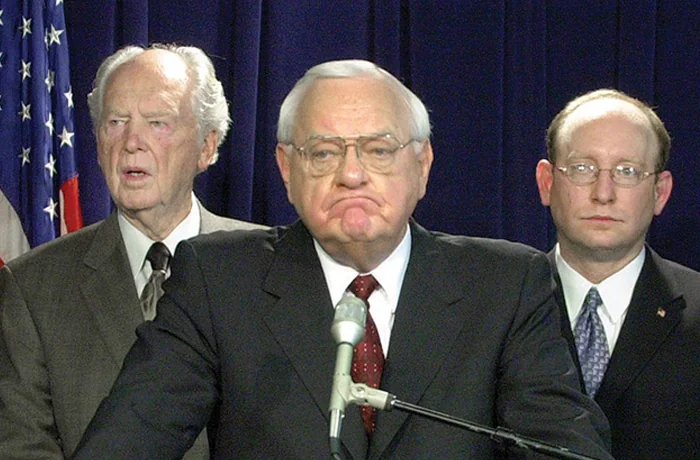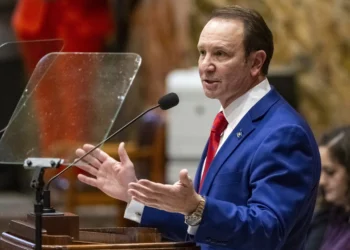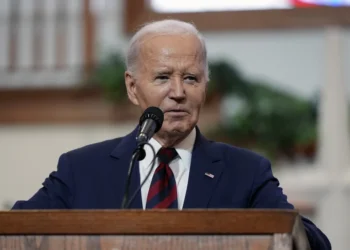When George Ryan, a small-town pharmacist turned Illinois governor, stood before the world in 2000 to halt his state’s death penalty, he didn’t just pause executions — he ignited a global conversation about law, mercy, and the fallibility of human justice. Ryan, who died this week at age 91 in his hometown of Kankakee, Illinois, lived a life that was equal parts triumph and tragedy: a political ascent marked by bold reforms, a catastrophic fall fueled by corruption, and a late-life redemption that never quite erased the stains of his past. He was a man who reshaped a state’s moral landscape while wrestling with his own flaws, leaving a legacy as complicated as the land he served.
Born in 1934, Ryan grew up in the heart of Illinois, where his family’s pharmacy was a community cornerstone. A sturdy, plain-spoken man with a knack for connecting with people, Ryan learned the art of service early, dispensing prescriptions and advice with equal care. After earning a pharmacy degree from Ferris State College in Michigan, he returned home, married his high school sweetheart, Lura Lynn, and built a life rooted in the values of hard work and civic duty. But the pharmacy counter couldn’t contain his ambitions. By 1968, Ryan was on the Kankakee County Board, the first step in his political climb, which would span three decades.
Ryan’s rise was steady and deliberate. In 1973, he was elected to the Illinois House. He served with a pragmatist’s zeal, becoming speaker in 1981. His tenure as lieutenant governor under James R. Thompson from 1983 to 1991 honed his ability to navigate Springfield’s fractious politics. As secretary of state from 1991 to 1999, he championed anti-drunk driving laws, saving countless lives with stricter regulations. By the time he won the governor’s mansion in 1998, Ryan was a Republican stalwart — a law-and-order man whose career seemed destined for a quiet, honorable capstone.

But destiny had other plans. Ryan’s governorship, from 1999 to 2003, became a crucible. In 2000, haunted by mounting evidence of wrongful convictions — 13 death row inmates were exonerated after Illinois reinstated capital punishment in 1977 — he declared a moratorium on executions.
“I cannot support a system so fraught with error,” he said in a steady voice but with seismic decisiveness.
Three years later, days before leaving office, Ryan went further. He commuted the sentences of all 167 death row inmates to life imprisonment and pardoned four outright. The move stunned the nation, drew praise from figures such as Archbishop Desmond Tutu, and earned Ryan a Nobel Peace Prize nomination. It also alienated his allies, including then-governor of Texas George W. Bush, whose state executed more prisoners than any other. Ryan’s act of conscience didn’t just challenge Illinois’s justice system. It set the stage for the state’s abolition of the death penalty in 2011 under former Gov. Pat Quinn.
Yet, even as Ryan reshaped history, shadows from his past closed in. His time as secretary of state, once a point of pride, became his undoing. A federal investigation uncovered a sprawling scandal: commercial driver’s licenses sold for bribes, with the proceeds allegedly funneled into Ryan’s campaign. The most damning blow came from a 1994 crash caused by an illegally licensed truck driver, which killed six children. The tragedy, tied to Ryan’s office, fueled public outrage and a relentless prosecution. In 2006, Ryan was convicted on 18 counts of racketeering, conspiracy, tax fraud, and lying to the FBI. Sentenced to 6 1/2 years, he served over five in federal prison, leaving his reputation in tatters.
“I never intended to harm anyone,” he maintained, but the jury saw a system that had become rotten under his watch.
Released in 2013, Ryan became a quieter man but not a defeated one. He co-authored a book, Until I Could Be Sure, with Maurice Possley, reflecting on his death penalty decision with unapologetic conviction.
“You gotta have a perfect law if you’re gonna have death as a penalty,” he told Capitol News Illinois in 2020.
He advocated criminal justice reform and lived modestly in Kankakee. Friends such as former House GOP leader Jim Durkin recalled a man who, even in his 80s, was greeted as “governor” by Kankakee locals, a nod to the respect Ryan still commanded. Yet, the corruption conviction loomed large — a reminder that heroism and hubris often share the same stage.
ROBIN KELLY JUMPS INTO ILLINOIS SENATE RACE FOR DURBIN’S SEAT
In the end, Ryan’s life was a paradox. He saved lives by questioning justice, only to lose his freedom to its verdict. He leaves behind Lynn, six children, and a state forever changed by his choices. As Kankakee gathers for his memorial, one can imagine Ryan, ever the pharmacist, mixing equal parts principle and pragmatism, with a wry smile for the bitter pills he swallowed along the way. Maybe he’d chuckle at the irony: a governor who freed others from death row, only to find his legacy caged by history’s judgment.
Daniel Ross Goodman is a Washington Examiner contributing writer and the author, most recently, of Soloveitchik’s Children: Irving Greenberg, David Hartman, Jonathan Sacks, and the Future of Jewish Theology in America.

















